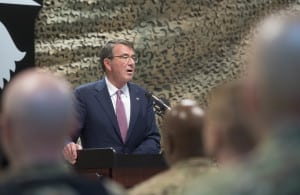
An additional 560 U.S. troops will be sent to Iraq where they will establish airfield operations in support of Iraqi forces fighting Islamic State militants.Secretary of Defense Ash Carter announced the personnel increase during a barnstorming visit to Baghdad between the NATO Summit in Warsaw, Poland, and a stop in Afghanistan.In Baghdad, Carter spoke to soldiers of the 101st Airborne Division along with Lt. Gen. Sean MacFarland, who commands U.S. troops in the multinational anti-ISIL Operation Inherent Resolve.Carter listed the…

 By
By 








